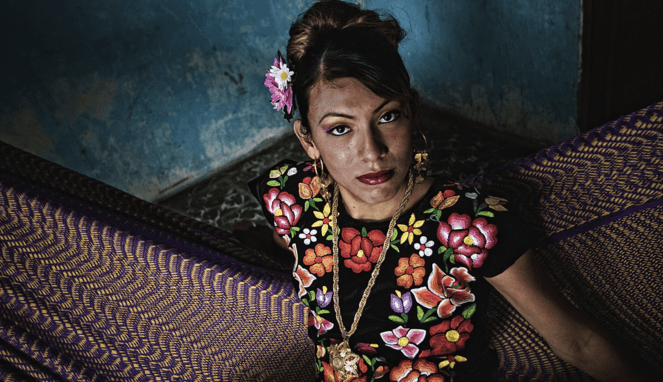Every November in Juchitán, Oaxaca, the four-day long celebration ‘La Vela de las Auténticas Intrépidas Buscadoras del Peligró’ (The Celebration of the Bold Seekers of Danger) takes over the streets, as locals gather in honor of the members of their third gender.
Muxes (pronounced Moo-Shay) are born men, but are trained from a young age by their family and friends to dress and live as women, in a Zapotec tradition that began before the Spanish colonisation of Mexico. They are considered a blessing in Zapotec culture, with most families consisting of one Muxe, who now often resumes the role of caretaker in the family.
“Sons and daughters get married and have families of their own, so the person that stays to care for the parents is the muxe. That’s why they are so highly valued.” Pedro Martinez Linares, muxe.
In Juchitán and all over the country, muxes are revered and enjoy much respect and admiration. Locals say that they have “fallen from a broken pocket of San Vicente Ferrer”, the patron saint of Juchitan, during his holy walk over the town (a local expression to say they are lucky, chosen people). Muxes have found place in the economic and political activities of their culture, many working in positions of power, in business, healthcare and congress.
Los Muxes (which in Zapotec language means homosexual) are a distinct third gender. They are not necessarily gay. Some take female lovers, some take male lovers. And while many dress as women (these are called Vestidas), some do not. The less common Pintadas wear make up but dress as men.
”I’m not a man… I’m not a woman… I’m a Muxe and there is a place for everybody in the Vineyard of Lord” – Felina, 36-year-old Muxe.
Each year, up to 5,000 other men, women and muxes come together for the huge, four-day celebration which ends in the crowning of the Queen.
The celebration has grown vastly over the past 40 years, since its beginning as a humble reunion-style party for a few older muxes celebrating their lives together. Today, it stands as a booming testament to a tradition that has withstood time and its many political and cultural upheavals and conflicts.
Image credits: Nicola “Ókin” Frioli, Erin Lee Holland, Ann Summa





